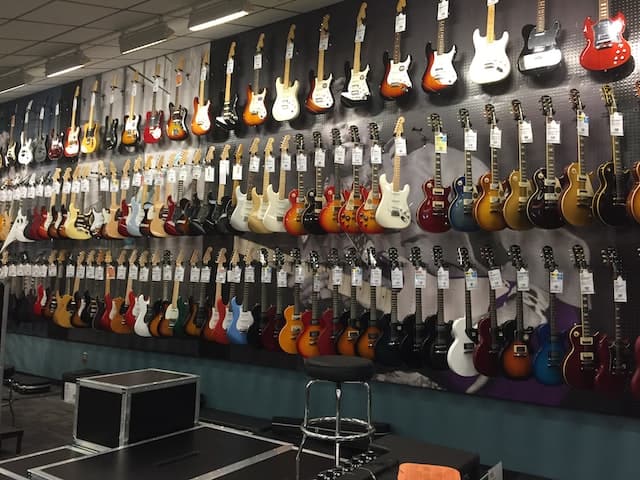If you’re considering selling your guitar, you have a lot of options.
One of those options is to head over to Guitar Center and take advantage of their trading program to sell your gear.
This has its benefits and drawbacks like anything else.
Trade-ins aren’t exactly like selling, but for the sake of today’s post, we’ll consider both because they are similar.
When trading your guitar in at Guitar Center, you have a couple of drawbacks to consider:
- You won’t get full market value
- If your guitar is worth more than $1000, you won’t be able to get cash-in-hand
- You might not be able to trade your gear for the guitar you want
- Possible shortchanging and nitpicking
- If you can afford to wait for a better offer, why not do that?
Obviously, there are reasons to trade in at Guitar Center, but we’ll cover that in another post.
The focus of today’s post is the downsides there are to trading your guitar in at this well-known Brick-and-mortar outlet.
1. You won’t get full market value
No matter how good the condition of your guitar is, you just won’t get more than 50-60% of the market value of your guitar.
The reason for this is simply because Guitar Center intends to resell and make a profit from your guitar.
I would say it’s fair, because apart from the cost of repairing any blemishes on your guitar, there’s also the cost of running their business, so after all is said and done, they really don’t make much after the sale.
They are running a business after all.
If you intend to get full market value for your gear, you’re better off selling it online or trading it in for a guitar with another musician who has an eye out for yours.
The chances of that happening are unlikely unless you have a very prized guitar though.
2. If your guitar is worth more than $1000, you won’t be able to get cash for it
If you’re just looking to trade your guitar in for another one, then you won’t have to worry about this issue, because as far as store credit goes, it doesn’t seem like there’s a limit.
But if you’re looking to sell your guitar purely for cash, the most that any Guitar Center retailer is allowed to give you is $1000, and that’s if they even have that much available in store.
It’s unlikely that you’ll be able to sell your guitar for $1000 because most average guitars today don’t even cost that much.
Unless you own a high-end guitar like a Gibson or a rare guitar like an early 1950s Fender Telecaster (Pre-CBS era and all that), you’re unlikely to get $1000 offered for it.
This is owing to the fact that you’ll usually only get offered around half of what the guitar is worth.
In that case, if you do own a pre-CBS era Fender and you want to part with it, post it online, and people will fight you for it.
3. You might not be able to trade your gear for the guitar you want
If you’re looking to simply trade your guitar in, there’s no guarantee that Guitar Center will have the guitar you want.
Unless you’ve been to the particular store you’re trading at, have had your eye on a guitar for a while, and have brought yours to trade for it, you may not always get what you want.
I couldn’t find anything on their site about using store credit to order a guitar not in-store, but you can always ask.
One thing is certain, Guitar Center takes great pride in their customer service, so it’s possible to order a guitar not in-store.
4. Possible shortchanging and nitpicking
I can’t say for sure, but there are some comments on Reddit forums about bad customer experiences at GC and while many people report good service, there’s always the possibility you wind up on the other end.
If you have any small nicks or bumps on your gear, you’ll likely take a knock in its value.
Obviously, this means extra repair costs for the company and they take that off their offer to you.
The best way to mitigate this problem is to make sure your guitar is in top shape before you take it in.
You can do a couple of things to make sure you don’t get shortchanged:
- Clean any dirt off the fretboard, body, and bridge
- Polish the fretboard with fretboard oil
- Clean the body with a microfiber cloth
- Make sure there’s no rust on the bridge or tuning pegs
- Make sure the tuning pegs aren’t loose or stiff
This counts for any time you’re trying to sell your guitar, but when it comes to working with a salesperson who might be looking to give you a bad deal, you don’t want to give them any excuses.
5. If you can afford to wait for a better offer, why not do that?
As I’ve mentioned, you’re unlikely to get the best deal for your gear when selling or trading at GC.
The only time I can imagine you would take the offer is if you needed money urgently or wanted a better guitar for an upcoming gig.
If you can afford to play the waiting game though, Guitar Center is not the best place for you to go. In fact, it’s well noted that many online platforms allow for greater control of what you get for your guitar, within reason of course.
This does mean that you’ll have to put in some work by taking photos, providing detailed descriptions, and making sure you’re selling your guitar at market value, but it’s better than getting 60% of what it’s worth.
At the end of the day, trading in at Guitar Center is a matter of trading value for convenience.
It’s easier and you’re less likely to be scammed, but by some measures, the amount you’re offered could be considered a scam in and of itself.

Hello there, my name is Ramiro and I’ve been playing guitar for almost 20 years. I’m obsessed with everything gear-related and I thought it might be worth sharing it. From guitars, pedals, amps, and synths to studio gear and production tips, I hope you find what I post here useful, and I’ll try my best to keep it entertaining also.





